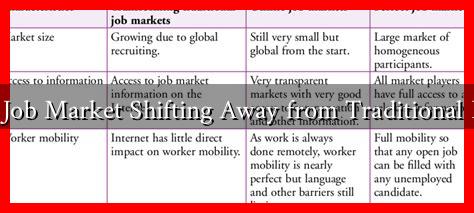-
Table of Contents
Is the Job Market Shifting Away from Traditional Roles?
The job market is undergoing a significant transformation, driven by technological advancements, changing societal norms, and evolving economic conditions. As we navigate through the 21st century, traditional roles are increasingly being challenged, leading to a shift in how we perceive work and employment. This article explores the factors contributing to this shift, the emerging trends, and what it means for the future of work.
Understanding Traditional Roles
Traditional roles typically refer to established job categories that have been prevalent for decades, such as clerical positions, manufacturing jobs, and even professional roles like law and medicine. These roles often come with a clear hierarchy, defined responsibilities, and a standard 9-to-5 work schedule. However, the landscape is changing, and several factors are driving this evolution.
Factors Driving the Shift
- Technological Advancements: Automation and artificial intelligence (AI) are reshaping industries. For instance, jobs in manufacturing are increasingly being performed by robots, while AI is taking over data analysis and customer service roles.
- Remote Work: The COVID-19 pandemic accelerated the adoption of remote work, leading many companies to reconsider the necessity of traditional office roles. A report by McKinsey found that 20-25% of the workforce could work remotely three to five days a week without a loss in productivity.
- Gig Economy: The rise of the gig economy has introduced flexible work arrangements, allowing individuals to take on freelance or contract work instead of traditional full-time positions. According to a study by Intuit, by 2023, 40% of American workers will be part of the gig economy.
- Changing Workforce Demographics: Millennials and Gen Z prioritize work-life balance, purpose-driven work, and flexibility. This shift in values is prompting companies to adapt their roles and work environments to attract and retain talent.
Emerging Trends in the Job Market
As traditional roles decline, several new trends are emerging in the job market:
- Hybrid Work Models: Many organizations are adopting hybrid work models that combine remote and in-office work, allowing employees to choose their work environment.
- Skill-Based Hiring: Employers are increasingly focusing on skills rather than formal qualifications. This trend is evident in tech companies that prioritize coding skills over degrees.
- Increased Demand for Soft Skills: As automation takes over technical tasks, soft skills like communication, problem-solving, and emotional intelligence are becoming more valuable.
- Rise of Entrepreneurship: With the barriers to entry for starting a business lower than ever, more individuals are opting to become entrepreneurs, creating their own roles rather than fitting into traditional job descriptions.
Case Studies: Companies Leading the Change
Several companies are at the forefront of this shift, demonstrating innovative approaches to work:
- GitLab: This all-remote company has no physical offices and operates with a fully distributed workforce, showcasing the potential of remote work.
- Buffer: Buffer has embraced transparency and flexibility, allowing employees to choose their work hours and locations, which has led to high employee satisfaction and retention.
- Salesforce: Salesforce has implemented a hybrid work model and emphasizes employee well-being, reflecting the changing priorities of the modern workforce.
Conclusion: The Future of Work
The job market is undeniably shifting away from traditional roles, influenced by technology, societal changes, and evolving workforce expectations. As we move forward, organizations must adapt to these changes by embracing flexibility, prioritizing skills over formal qualifications, and fostering a culture that values employee well-being. The future of work will likely be characterized by a blend of traditional and non-traditional roles, where adaptability and continuous learning become essential for success.
In summary, the job market is not just changing; it is transforming into a more dynamic and inclusive environment. As we embrace this evolution, both employers and employees must be prepared to navigate the complexities of the new world of work.
For further insights on the future of work, you can explore resources from McKinsey & Company.

